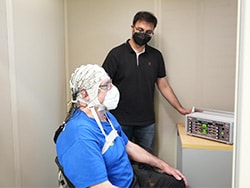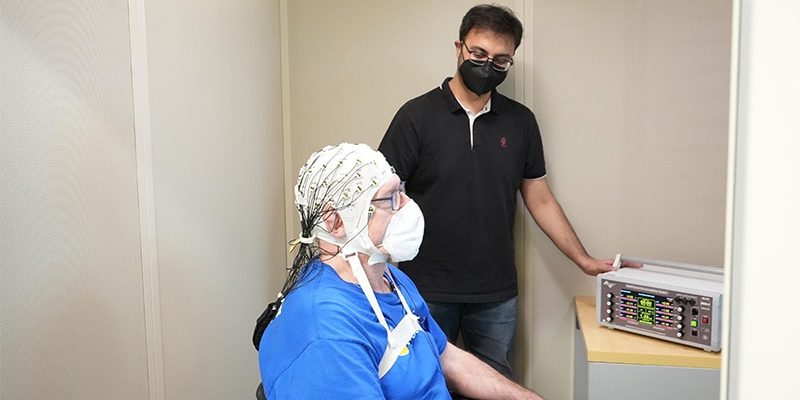Transcranial alternating current stimulation (tACS) for 20 minutes over 4 consecutive days can improve both short- and long-term memory for at least 1 month in older adults, new research suggests.
The effects were “moderate to large and the overwhelming majority of participants, 85% to 90%, experienced the memory benefit,” study investigator Robert Reinhart, PhD, Cognitive Neuroimaging Center, Boston University, Boston, Massachusetts, said during a press briefing.
The results were published online August 22 in Nature Neuroscience.
Accumulating, Lasting Benefits
The study included 150 adults aged 65-88 years, most of whom had typical memory loss or mild cognitive impairment (MCI). Electrical currents were delivered through electrodes embedded in a cap worn by participants.
On the basis of prior research, the investigators targeted two specific brain regions with two distinct stimulation frequencies.

Targeting the inferior parietal cortex at a low frequency of 4 Hz selectively improved working (short-term) memory, without changing long-term memory, they report.
Targeting the dorsolateral prefrontal cortex at 60 Hz selectively improved long-term memory, without changing short-term memory.
“Based on the spatial location and the frequency of the electrical stimulation, we can improve either short-term memory or long-term memory separately,” Reinhart told briefing attendees.
The rate of memory improvement during the 4-day intervention predicted the size of the memory benefit at the 1 month timepoint.
“In other words, the memory benefits are accumulating at some rate during the 4-day intervention. And this rate of improvement is highly predictive of the size of the memory benefits we see 1 month later,” Reinhart noted.
“So, based on how well you respond to the treatments, we can be reasonably confident how long lasting the memory benefits will be for each individual,” he said.
Real-World Impact?
The researchers note the participants with the lowest cognitive performance at baseline benefited the most from brain stimulation during the process and 1 month later.
“We think it bodes well for transferring this intervention over to a proper clinical study with people with Alzheimer’s disease who are suffering from more severe memory impairment, because we’re finding that the more severe one’s general cognitive impairment is, the more they benefit from this novel drug-free intervention,” Reinhart said.
Coinvestigator Shrey Grover, PhD candidate in the brain, behavior and cognition program at Boston University, said the researchers have not observed any adverse events during the stimulation, “so it’s quite tolerable.”
“Typically, people experience a little bit of itching and tingling sensations for approximately 30 to 60 seconds at the beginning of the stimulation, and then 30 to 60 seconds at the end of the stimulation,” said Grover.
The investigators plan to continue their research to examine whether the effects last beyond 1 month and assess functional outcomes of the brain stimulation-induced memory improvements.
“We need these kinds of real-world endpoints, not just the laboratory ones, that are more relevant for reducing the severe functional, social, and economic impact of impaired cognition that comes with age to really bring this intervention from the bench to the bedside,” Reinhart said.
More Research Needed
Commenting for Medscape Medical News, Heather Snyder, PhD, vice president of medical and scientific relations at the Alzheimer’s Association, called the study “interesting and encouraging.”
“It is unclear how this intervention may impact individuals either at increased risk for cognitive decline and/or with already existing cognitive decline. This research should continue in larger and more diverse populations,” said Snyder, who was not involved with the study.
“It’s important we explore all treatment avenues that may benefit the brains of aging individuals. There are several studies — some funded through the Alzheimer’s Association’s Part the Cloud program looking at different types of interventions that may benefit cognition and function for an individual,” she added.
The study was funded by grants from the National Institutes of Health and by a generous gift from an individual philanthropist awarded to Reinhart. The investigators and Snyder have reported no relevant financial relationships.
Nat Neurosci. Published online August 22, 2022. Full text
For more Medscape Neurology news, join us on Facebook and Twitter
Source: Read Full Article
